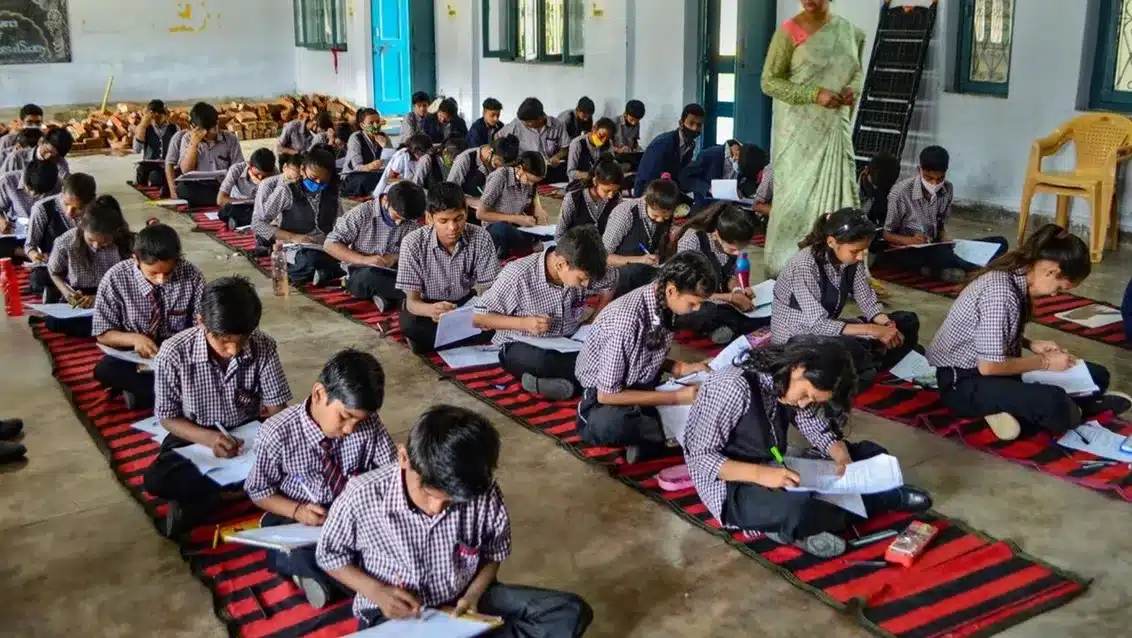What’s in today’s article?
- Why in News?
- Rationale behind the no-detention policy
- Why has no-detention policy been rolled back?
- Way forward
Why in News?
- In December 2024, the Union government amended the Rules of the Right to Education (RTE) Act, 2009, allowing schools, including Central government-run schools, to detain students in Classes 5 and 8 if they fail year-end examinations.
- Students will have a second chance to pass through a re-examination after two months of additional teaching. This move aligns with a 2019 amendment that rolled back the RTE Act’s no-detention policy, with 18 States and UTs already reinstating the option to detain students.
Rationale behind the no-detention policy
- Original No-Detention Policy under RTE Act (2009)
- The RTE Act, 2009, included Section 16, which prohibited detention or expulsion of students from Classes 1 to 8.
- The aim was to create a stress-free learning environment and shift away from high-pressure, single-exam assessments.
- Challenges in Implementation
- Misinterpretation of No-Detention Policy: Many schools misapplied the policy, leading to the absence of testing and reduced accountability for teaching outcomes.
- Automatic Promotions: Government schools often promoted students automatically without assessing whether they acquired grade-specific skills.
- Lack of Focus on Outcomes: Monitoring systems emphasized inputs rather than learning outcomes.
- Failure of Continuous and Comprehensive Evaluation (CCE)
- Implementation Issues: Efforts to introduce CCE with support from UNICEF were hindered by inadequate resources, teacher training, and lack of commitment.
- Poor Execution: Teachers often filled NCERT’s CCE forms en masse without assessing individual students’ skills.
- Abandonment of CCE: Many boards reverted to traditional year-end examinations, abandoning the CCE model of multiple assessments.
- Key Observation
- Experts highlighted that the poor implementation of the no-detention policy and CCE led to a decline in teaching standards and learning outcomes.
Why has the no-detention policy been rolled back?
- Alarming Learning Gaps in Indian Schools
- Surveys reveal significant deficits in basic literacy and numeracy skills among Indian students, highlighting a worsening trend over recent years.
- Findings from the ASER Report
- Class 5 Literacy and Arithmetic Decline:
- In 2022, only 42.8% of Class 5 students could read a Class 2-level text, down from 50.5% in 2018.
- Only 25.6% could solve basic arithmetic problems, a drop from 27.9% in 2018.
- Youth Foundational Skill Gaps (ASER 2023):
- A quarter of 14- to 18-year-olds cannot fluently read a Class 2-level text in their regional language.
- Over half struggle with division problems taught in Classes 3 and 4.
- Class 5 Literacy and Arithmetic Decline:
- High Failure Rates in Board Examinations (2023)
- Classes 10 and 12 Results: Over 65 lakh students failed across 59 boards.
- Failure rates: 12% in national boards, 18% in State boards.
- Expert Opinions on Learning Gaps
- Impact of Automatic Promotions
- Promoting all students without accountability in lower classes harms them in later life. COVID-19 disruptions worsened the learning gap.
- Evidence-Based Decision Making
- Experts supported the rollback of the no-detention policy as a response to the evident learning crisis.
- Impact of Automatic Promotions
- Need for Better Mechanisms
- Analysts, however, called for improved systems to assess children’s learning outcomes and hold teachers accountable, rather than regressing to detention practices.
Way Forward
- Call for Timely Remedial Action
- Regular assessments must be conducted at the school level for every class, rather than relying on board-level evaluations.
- Teachers are the best judges of a child’s learning and should be trusted and equipped for this responsibility.
- Focus on Targeted Support and Accountability
- Class teachers are required to identify learning gaps and provide specialised inputs at various stages.
- School Heads are mandated to personally monitor the progress of children who are held back, introducing more accountability.
- Shifting Accountability from Students to Teachers
- Detaining students punishes them for not performing well, instead of addressing the root cause.
- Teachers must be held accountable for inclusive teaching and their focus on all students, including those from disadvantaged backgrounds.
- Recommendations for Teacher Accountability
- Introduce rigorous teacher appraisals to ensure inclusivity and fairness in teaching.
- Implement consequences for teachers failing to meet standards, along with incentives to encourage better performance.
Q.1. Why was the no-detention policy under the RTE Act rolled back?
The policy was rolled back due to significant learning gaps in literacy and numeracy among students, misimplementation of continuous evaluation, and automatic promotions that harmed long-term educational outcomes.
Q.2. What are the challenges and recommendations for improving learning outcomes?
Challenges include poor teacher accountability and inclusive teaching practices. Recommendations involve regular assessments, targeted remedial action, rigorous teacher appraisals, and systems to monitor learning outcomes effectively.
Source: Why was the no-detention policy rolled back?: Explained
Last updated on June, 2025
→ UPSC Notification 2025 was released on 22nd January 2025.
→ UPSC Prelims Result 2025 is out now for the CSE held on 25 May 2025.
→ UPSC Prelims Question Paper 2025 and Unofficial Prelims Answer Key 2025 are available now.
→ UPSC Calendar 2026 is released on 15th May, 2025.
→ The UPSC Vacancy 2025 were released 1129, out of which 979 were for UPSC CSE and remaining 150 are for UPSC IFoS.
→ UPSC Mains 2025 will be conducted on 22nd August 2025.
→ UPSC Prelims 2026 will be conducted on 24th May, 2026 & UPSC Mains 2026 will be conducted on 21st August 2026.
→ The UPSC Selection Process is of 3 stages-Prelims, Mains and Interview.
→ UPSC Result 2024 is released with latest UPSC Marksheet 2024. Check Now!
→ UPSC Toppers List 2024 is released now. Shakti Dubey is UPSC AIR 1 2024 Topper.
→ Also check Best IAS Coaching in Delhi
























